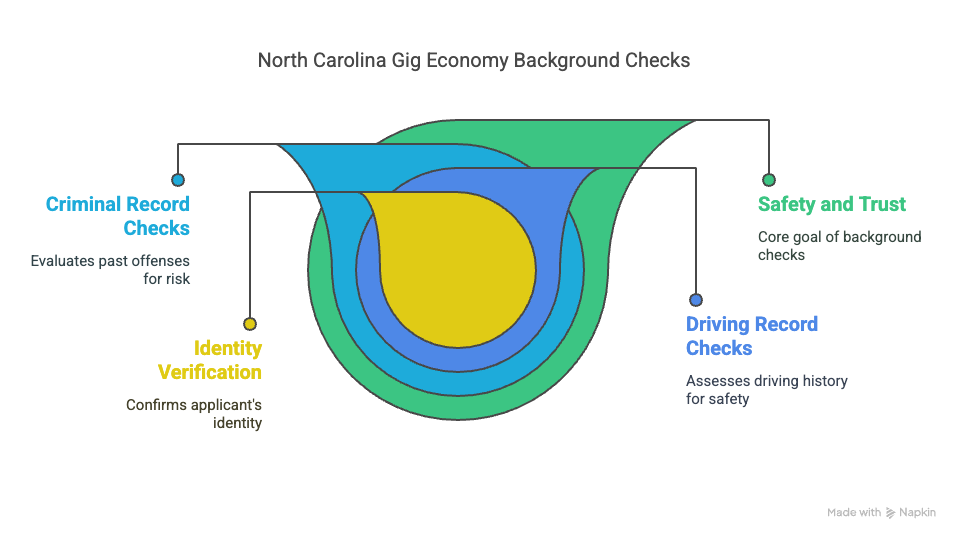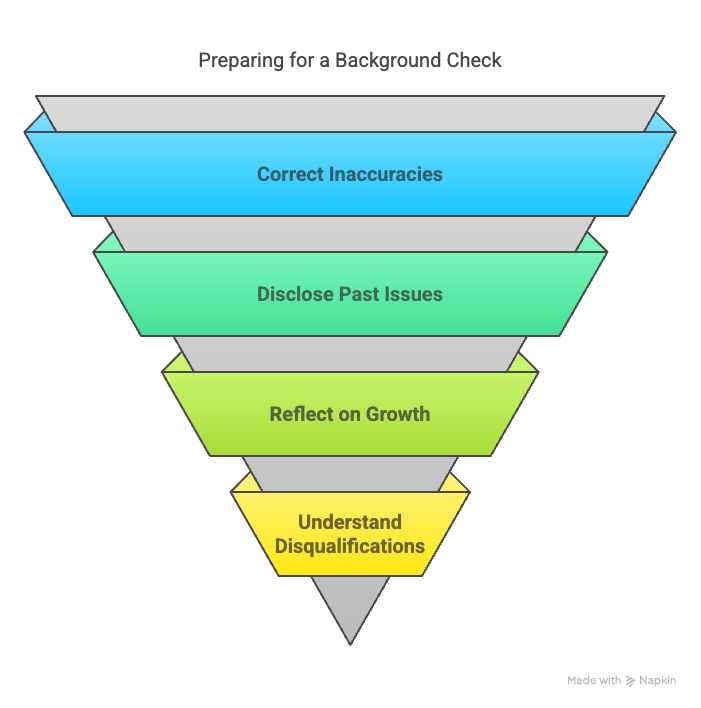The gig economy, encompassing rideshare services like Uber and Lyft, as well as food delivery platforms, is booming in North Carolina. These flexible job opportunities attract many, but they come with a significant requirement: thorough background checks. Understanding these checks is crucial for potential gig workers and employers alike. This guide unpacks the ins and outs of the screening process for gig economy roles in North Carolina, helping you navigate the intricacies of this dynamic job landscape.
Key Takeaways
- The gig economy in North Carolina is expanding, with a focus on rideshare and food delivery services like Uber, Lyft, DoorDash, and Grubhub.
- Background checks are essential for these jobs, ensuring safety, reliability, and trust for both workers and users.
- Rideshare platforms conduct detailed checks, focusing on criminal records, driving history, and identity verification.
- Food delivery services prioritize criminal background checks but may place less emphasis on driving records depending on the role.
- Staying informed about the screening processes and potential regulatory changes can improve your chances of success.
Introduction
The gig economy is growing rapidly, especially in North Carolina, where rideshare and food delivery services are gaining popularity. Rideshare giants like Uber and Lyft, along with delivery apps such as DoorDash and Grubhub, are leading the charge. These platforms bring flexibility and income opportunities but also demand rigorous background checks for the safety and security of all parties involved.
Background checks are not just a procedural formality; they are a critical component in maintaining trust. For gig workers, they represent an entry point into these flexible jobs. For users and companies, they ensure reliability and peace of mind. Whether you're considering joining this sector or hiring gig workers, understanding these checks is essential. How well do you know the screening processes that power this dynamic field?
Understanding North Carolina Gig Economy Background Checks
Background checks in North Carolina's gig economy are multifaceted. When platforms like Uber and Lyft review applicants, they primarily assess criminal records, driving records, and verify identities. These checks play a pivotal role in ensuring passenger and community safety, while also maintaining the trustworthiness of the service.
Criminal record checks aim to identify any past offenses that could pose a risk to customers. This might include looking into state and national databases for felonies, misdemeanors, or any pending charges. For potential drivers, having a criminal record doesn't always mean rejection. However, certain convictions, especially those related to violence or theft, are more likely to lead to disqualification.
Driving records are just as critical. Platforms review these to assess an applicant's history behind the wheel. They look for traffic violations, accidents, and any instances of reckless driving. A clean record increases the chances of passing the check, but minor infractions might not be deal-breakers. The threshold varies by company, yet the focus is on serious offenses like DUIs or license suspensions.
Identity verification is the third vital component. This step confirms that applicants are who they claim to be and that they hold a valid driver's license. With identity theft on the rise, this process is crucial in preventing fraudulent applications.
For food delivery services, the emphasis is slightly different. While criminal checks remain stringent, driving records may not be scrutinized as closely since not all roles involve direct passenger interaction. However, reliable transportation and timeliness in deliveries are still paramount.

Background checks in North Carolina are governed by regulations that encourage fair hiring while prioritizing safety. The criteria and outcomes of these checks are designed to balance opportunity with responsibility. As a potential gig worker, understanding these elements can guide your preparation and enhance your chance of a successful application. Have you reviewed your records recently? It might be time to take a closer look before you apply.
NC Rideshare Screening: Uber and Lyft
In the gig economy, becoming an Uber or Lyft driver in North Carolina starts with a thorough background check. This process involves several key steps designed to protect both drivers and passengers.
Steps in the Screening Process
First, you'll need to submit personal information, including your full name, date of birth, and Social Security number. This data helps in verifying your identity and initiating the background check. Next, you undergo a check of your driving record. This review ensures you meet the safe driving standards required to transport others.
The screening also examines your criminal history, extending back seven years in most cases. The check looks for any serious offenses that might disqualify you. Finally, there is an identity verification stage where you upload documentation like a driver's license and vehicle registration.
Criteria for Disqualification
Certain factors can disqualify you from driving for Uber or Lyft. These typically include having a DUI conviction in the past seven years, a violent crime record, or any major driving-related offenses, such as reckless driving or a suspended license. Each company has its criteria, but safety and reliability are the core concerns.
Continuous Monitoring
Once you're approved, the screening doesn't stop. Continuous monitoring is a critical part of the process. Uber and Lyft keep tabs on drivers through periodic checks. This helps detect new traffic violations or criminal activities as they occur.
These ongoing checks are part of maintaining a safe environment for riders and upholding the companyâs standards. As a driver, this means it's essential to keep a clean record even after the initial screening.
Being informed about these steps and criteria helps you navigate the application process with confidence. Knowing what's involved upfront can save time and help address any potential issues early. Are you ready to hit the road legally and securely?
Food Delivery Checks NC
If you're thinking about joining a food delivery service like DoorDash, Grubhub, or UberEats in North Carolina, it's important to understand their background check process. The goal is to ensure safety and trust for customers receiving your deliveries.
The process begins with submitting your personal information. This typically includes your full name, Social Security number, and sometimes a driverâs license number if youâll be using a vehicle. These companies use this data to run a criminal background check. They'll look for past convictions that might disqualify you, such as violent crimes or theft.
Food delivery checks differ from those in rideshare services in a few ways. Since your main interaction is with the food and not directly with the customer in a vehicle, there's often less focus on your driving record. However, if you're delivering by car, a valid license and a clean driving record might still be necessary.
Frequent disqualifications for food delivery gigs include serious offenses on criminal records. Reliable service is crucial, so a background that suggests potential risk can hinder your application. Though the standards might not be as stringent as rideshare checks, offenses that imply a risk to property or safety can be red flags.
Security and reliability are priorities when these companies vet potential workers. Understanding this can help you decide if you're ready to apply or need further preparation to meet these requirements.
Gig Worker Disqualifications
Disqualifications in the gig economy are largely about safety and trust. Different platforms have specific criteria, but some red flags are consistent across the board.
DUI charges are top disqualifiers. For rideshare and delivery drivers, these show a disregard for road safety. A DUI can stick on your record for several years, affecting job prospects in this sector. Violent offenses, such as assault or battery, are also major disqualifiers. These offenses raise concerns about passenger and customer safety.
Theft and fraud convictions can halt your application, too. Companies prioritize roles that involve direct contact with people or handling their property, making these offenses a no-go. Background checks also highlight recent criminal activity. Generally, a conviction in the past seven years will raise eyebrows, though this varies by company.
When results are unclear or contain errors, you have options. Appeal processes exist, though they vary by platform. Start by requesting a copy of your background check. Review it for any inaccuracies. If you find discrepancies, dispute them. Legally, companies must give you the chance to correct mistakes. Supporting documents like court records can be crucial here.
Some companies allow an appeal if a disqualifying event occurred years ago. Usually, this means showing positive changes since then, like a clean record or completed rehabilitation programs. Remember, how you handle an appeal can demonstrate your professionalism and commitment to transparency.
Regardless of past issues, there's a path forward. Understanding and addressing potential disqualifications openly can help keep opportunities within reach.
Ensuring Positive Screening Outcomes
Boost your chances of passing a background check by taking a few proactive steps. First, obtain a copy of your criminal and driving records. Knowing what potential employers will see puts you in control. In North Carolina, these records can be accessed online or through local government offices.
Fix any inaccuracies you find in your records. Mistakes happen, and you want your record as clean as possible before a prospective employer views it. Correcting errors can take time, so start early in the job application process.
Disclose any relevant past issues when asked. Honesty goes a long way in building trust with potential employers. They prefer upfront transparency rather than discovering discrepancies in your records later.
Reflect on your strengths and how youâve grown from past setbacks. Employers appreciate those who learn from their experiences. Craft a clear, concise explanation that shows how you've improved since any past incidents.
Understanding the criteria used for disqualification can also help. If you're unclear about specific disqualifications, research or ask directly during the application process. Knowing this information allows you to address concerns head on.

Do these steps seem manageable? If youâre unsure, consider consulting with a professional advisor familiar with gig work screenings. A little preparation can prevent an unpleasant surprise during your background check.
The Future of the Gig Economy in North Carolina
Technology is reshaping background checks in the gig economy. Automation and artificial intelligence streamline the process, making it faster and more efficient. Real-time data collection allows companies to monitor workers continually, ensuring safety and compliance at all times. For gig positions in North Carolina, this means quicker verification, which can reduce the wait time for new drivers or delivery partners.
Regulatory landscapes are evolving too. Expect changes that adapt to the growing reliance on gig workers. Legislation may soon require deeper checks or mandate specific screening processes to protect consumers and workers. Consider potential shifts towards more stringent data privacy regulations. They could affect how information is collected and used in screenings.
With new technology and laws, what won't change is the importance of understanding these mechanisms. Staying informed and prepared will be essential for anyone involved in the gig economy. How will you adapt to these changes? Your success may depend on it.
Conclusion
Understanding the background checks in North Carolina's gig economy is crucial. For both rideshare and food delivery drivers, safety and compliance are non-negotiable. The steps in the screening process are clear: provide your personal information, undergo criminal and driving record checks, and expect continuous monitoring. Disqualifications are also straightforward - major driving offenses and recent criminal activity can hinder your progress.
Being prepared is your best strategy. Start by reviewing your records and be ready to discuss any past issues honestly. Transparency will work in your favor. With background checks becoming more tech-driven, staying informed about potential regulatory changes will keep you ahead. Take charge of the process and be proactive in your approach as you navigate these opportunities.
Frequently Asked Questions (FAQs)
What disqualifies you from Uber in NC?
If you have a history of major driving violations or a criminal record involving violent crimes, you may be disqualified from driving with Uber in North Carolina.
Does Lyft check criminal history in North Carolina?
Yes, Lyft conducts criminal background checks for drivers in North Carolina to ensure safety for all users.
Can a DUI affect gig work in NC?
Yes, a DUI can impact your eligibility for gig work, as many companies perform driving record checks and may deny applications based on past offenses.
How often do gig companies recheck backgrounds in NC?
Background checks are typically reviewed annually, but policies may vary by company. Always check with the specific company for their procedures.
Are NC gig workers considered employees?
No, most gig workers in North Carolina are classified as independent contractors, not employees.
Can you appeal a gig background check denial in NC?
Yes, you can appeal a background check denial. Contact the company for their specific appeal process and provide any supporting documentation that could aid your case.
Do gig companies check credit history in NC?
Most gig economy companies do not check credit history as part of their background checks.
How far back do Uber checks go in NC?
Uber typically reviews a candidate's driving record and criminal history for the past seven years.
Are misdemeanors a problem for gig work in NC?
Misdemeanors can affect your eligibility, especially if they relate to driving or violent offenses. Each company has its own policies on what is acceptable.
Do delivery drivers need fingerprinting in NC?
No, fingerprinting is generally not required for delivery drivers in North Carolina.
What are the basic requirements for gig workers in NC?
Basic requirements generally include being at least 18 years old, having a valid driver's license, and possessing a reliable vehicle. Requirements can vary by platform.
Can you work for multiple gig companies at once in NC?
Yes, many workers in the gig economy work for multiple companies simultaneously to maximize their income.
How do gig companies pay workers in NC?
Payments are usually made weekly or daily, depending on the platform, through direct deposit or an online payment system.
Is there a minimum hourly rate for gig work in NC?
Gig work does not have a set hourly rate; earnings depend on the number of jobs completed, time worked, and tips received.
Definitions
Background Check
A background check is a review of your personal, criminal, and driving history. Gig companies like Uber, Lyft, and DoorDash use this to decide whether to bring you on board. They look for anything that might raise safety concerns, such as serious traffic violations or past criminal activity. These checks typically cover the last seven years and may include identity verification. If youâve had legal issues, it helps to know whatâs on your record before applying.
Driving Record
Your driving record shows your history behind the wheel. It includes accidents, traffic tickets, license suspensions, and serious violations like DUIs. Rideshare services rely on this information to ensure new drivers can operate safely. A clean record improves your chances of passing. If youâve had issues, check your stateâs DMV website to see whatâs listed.
Disqualification
Disqualification means you canât work on a gig platform due to specific issues in your background check. Common reasons include criminal convictions, DUIs, reckless driving, or active license suspensions. Each company sets its own standards, but most take a hard line on anything that impacts safety. If youâve been disqualified and think it was in error, you can appeal with supporting documentation.
Continuous Monitoring
Continuous monitoring is how companies keep track of your record after you've been hired. It means your background is regularly reviewed for new violations or charges. For example, Uber and Lyft are alerted if a driver gets a new DUI or major ticket. This helps them respond quickly to any safety concerns. If you're active on a gig platform, staying out of legal trouble remains important even after approval.
Identity Verification
Identity verification confirms that you are who you say you are. Gig platforms ask for details like your name, birthday, and Social Security number â plus documents like your driverâs license. This step helps prevent fraud and ensures your qualifications are valid. If the information doesnât match or seems suspicious, it might delay or block your application. Taking time to submit accurate data helps avoid issues.

GCheck Editorial Team
Meet the GCheck Editorial Team, your trusted source for insightful and up-to-date information in the world of employment background checks. Committed to delivering the latest trends, best practices, and industry insights, our team is dedicated to keeping you informed.
With a passion for ensuring accuracy, compliance, and efficiency in background screening, we are your go-to experts in the field. Stay tuned for our comprehensive articles, guides, and analysis, designed to empower businesses and individuals with the knowledge they need to make informed decisions.
At GCheck, we're here to guide you through the complexities of background checks, every step of the way.





